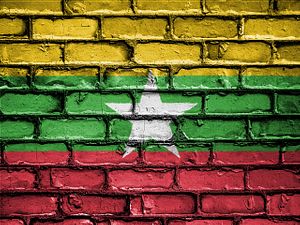Authorities in Myanmar have arrested the American editor of a local news publication as he attempted to board a flight to Malaysia. Danny Fenster, 37, a U.S. citizen who serves as the managing editor of Frontier Myanmar, was detained yesterday morning at Yangon International Airport, the publication announced on its official Twitter account.
“We do not know why Danny was detained and have not been able to contact him since this morning,” the publication stated. “We are concerned for his wellbeing and call for his immediate release.”
Frontier’s editor in chief Thomas Kean told Agence France-Presse Fenster had been working for the outlet for around a year and was heading home to see his family. “We learned about 10am that Danny had not been allowed to board his flight from Yangon airport,” he said.
In its statement, Frontier said it understood Fenster had been transferred to Insein Prison in the outskirts of Yangon.
Since its founding in 2015, Frontier Myanmar has become an indispensable part of Myanmar’s media, encapsulating the increased openness that accompanied the country’s partial political opening over the past decade. Since the military coup of February 1, it has distinguished itself by its sober, granular reporting of the country’s unfolding crisis.
Since the coup, more than 800 people have been killed as the security forces have sought to put down nationwide protests and strikes. The crackdown has also extended to the press. An estimated 80 journalists have been arrested since the coup, at least 34 of whom remain in detention. The junta has also choked off internet access and revoked the licenses of five local media outlets – although not Frontier Myanmar.
The junta has also shown little compunction about detaining foreign journalists, who frequently enjoy a degree of immunity by virtue of their foreign passport. Japanese reporter Kitazumi Yuki was detained by authorities in Myanmar last month and was similarly held in Insein Prison until being freed last week. Separately, the Polish freelance photojournalist Robert Bociaga, a frequent contributor to The Diplomat, was arrested while covering protests in Shan State and spent two weeks in detention before his release in March. Both Kitazumi and Bociaga were deported after their release.
While the travails of foreign journalists should not distract the world from the plight facing local reporters, the military junta’s willingness to target foreign reporters speaks to its increasing paranoia and its contempt for international opinion.
Unlike Bociaga and Kitazumi, Fenster was not detained while “in the act” of reporting or covering protests. The Myanmar government could simply have let him board his flight and leave the country, but instead chose to take the confrontational step of detaining him. Herve Lemahieu of Australia’s Lowy Institute, told AFP that the arrest was intended “as a deterrent for local journalists. A sign that no one is outside their grasp.”
The arrest does not bode well for the prospects that Sen. Gen. Min Aung Hlaing and the military government terms might prove amenable to peaceful dialogue. Indeed, it is another sign that the junta is digging in and preparing to weather a long period of isolation and alienation from the democracies of the West.
Fenster’s detention came after the head of Myanmar’s military-appointed Union Election Commission (UEC) said Friday that the agency would consider dissolving Aung San Suu Kyi’s National League for Democracy for alleged involvement in electoral fraud at the national election in November. “We will investigate and consider whether the party should be dissolved, and whether the perpetrators should be punished as traitors,” said UEC Chairman Thein Soe.
When it seized power in February, few accepted the military’s assurance that it would hold free and fair elections within a year, and few were surprised when the military later extended its deadline out to two years. It now seems increasingly likely that Min Aung Hlaing and the junta are prepared to wait a lot longer to ensure their hold on power.

































